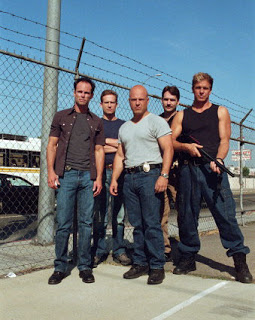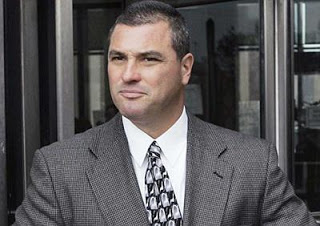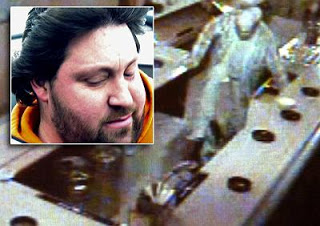The Chicago Police Department: A Perpetual Crime Wave
 Police as street gang — fiction: The murderous, amoral Det. Vic Mackey and his Strike Team crew from the F/X drama The Shield. For the reality, see Jerome Finnigan and his outfit from Chicago’s Special Operations Section (below left).
Police as street gang — fiction: The murderous, amoral Det. Vic Mackey and his Strike Team crew from the F/X drama The Shield. For the reality, see Jerome Finnigan and his outfit from Chicago’s Special Operations Section (below left).
“So I’m walking down the street and I was minding my own business,” recalled Chicago resident Vance Estes. “The police come up out of nowhere, right up on me, get out of the car.”
Surrounding the puzzled man, the police asked if he had drugs or guns in his possession. Finding that their prey was unarmed and not carrying contraband, the officers threw him into the back of a car and demanded ID. Rather than running a background check, however, the police used the ID to learn the Estes’ home address. On their arrival, the officers kicked in the door, seized Estes’ pregnant girlfriend, and ransacked the apartment, making off with roughly $1000 in cash.
Then they arrested the victim on bogus gun and drug charges. Estes spent eight months in jail following that January 6, 2006 assault before the charges against him were dropped.
In January 2004, Elvis McMillian was visiting a friend’s home playing a video game when a police squad “broke out the kitchen window,” he recalled to the Chicago Tribune. The officers stole $1,500 and arrested McMillian on drug charges, which were subsequently dropped.
The following year, police stormed into the home of Rene Guerrero, a 30-year-old paraplegic and handcuffed him face-down, mocking his disability as they looted his apartment.
“Shut the f*** up, you handicapped motherf****r,” snarled one of the heroes in blue as Guerrero complained about his treatment. Another reported said it would be “funny” to see the wheelchair-bound man get up and try to run.
After the police found a gun – which Guerrero, who has a felony drug conviction, wasn’t permitted to own – they dragged him to the police station, where he was held for 25 hours without being given medical attention (he needed a catheter to urinate). He eventually pleaded guilty to a misdemeanor charge, which should have been dismissed on account of the illegal search that turned up the gun.
Anthony Castro, who resides in the same neighborhood, received a similar visit from police, who tossed his apartment in a warrantless search. The officers found a quantity of cocaine and $12,000; however, in Castro’s case, they promised not to charge him if he would provide them with a business referral – that is, the name and address of another victim. After Castro provided the name of an “immigrant who had money,” the police raided that man’s home, planting a small quantity of Castro’s cocaine and stealing some $5,500.
Chad Overly was driving a truck through the same section of Chicago on November 2, 2005 when he was cut off by a police officer who forced him to pull over. The officer ordered Overly from his cab and “began to attack him,” reports the trucker. When Overly tried to call 911, the officer threatened him with a gun.
As is always the case when a police officer beats an unarmed, innocent civilian, the victim in this episode was charged with battery – but the charge was dropped with the officer who attacked Overly pulled a no-show in court.
Miguel Melesio’s experience was sort of a combination platter of the foregoing incidents.
In November 2004, Miguel, 18 years old at the time, was stopped by three unmarked cars.
The police “just started searching me and didn’t give me any reasons for stopping me,” Miguel later told Chicago’s NBC affiliate. The cops had no probable cause to search Miguel or his vehicle. They had no warrant to search his home. Yet they used Miguel’s personal information to learn his home address. The cops — “two guys and one woman,” recalled Miguel’s sister Marisol – searched the family’s home, seizing some $13,000 in cash the family members had pooled together.
Having that much cash on hand is dangerous, of course, particularly in a crime-prone section of Chicago. The Melesio family had protected it savings from street gangs, but lost them to the depredations of the city’s most dangerous criminal syndicate: The Special Operations Section (SOS), commonly referred to as “Sons of Supervisors” in testimony of its elitist nature.
Created with a broad mandate for aggressive “proactive” street enforcement, the SOS has been barraged with dozens of lawsuits involving thousands of complaints from hundreds of residents whose experiences follow the pattern described above: Sudden, unjustified detention and search, followed by an armed robbery by the police and, often, spurious criminal charges intended to silence the victims.

Predictably, Chicago Police Superintendent Phil Cline insists that this scandal doesn’t mean that the SOS unit should be disbanded. “The SOS unit has done a wonderful job in helping to reduce violent crime in the city,” Cline insisted a year ago. “There’s no reason to disband the SOS unit…. [T]his is four officers out of over 300 [unit members] that are accused of a crime.”
Apart from the six (not “four”) SOS members facing trial, there’s ample reason to believe that the entire unit is infected with the criminal corruption that is an unavoidable product of official impunity.
In March 2004, at least a dozen and as many as 30 SOS officers swarmed Caballo’s Bar in the same section of Chicago where Finnigan and his comrades conducted their crime spree. Without probable cause or a warrant of any kind, the officers calmly filed in and began searching everybody in the establishment. Eventually the arrested two patrons, Raymundo Martinez and Jose Reyes, for cocaine possession. While Martinez and Reyes were in jail on charges that were subsequently dropped, SOS officers were raiding their homes, stealing money and other valuables that were never returned.
“You essentially have false arrests, [a] false search, you have interference with a business,” relates attorney Christopher Smith, who was hired by Martinez and Barbara Heidegger, the latter being owner of Caballo’s Bar. “You’ve got, essentially, a kidnapping when they take them out without probable cause.”
To all of this must be added armed robbery and related charges. And of course, every one of the police officers who took part in the illegal search of the bar is at best an accessory to kidnapping and armed robbery. And there should be criminal charges arising from the false police report of the incident, which claims that Martinez provoked the search by throwing a beer bottle at a patrolman: A security camera videotape, which Heidegger kept under lock and key for years, documents that no such incident occurred, and that the police calmly filed into the establishment without displaying any of the urgency one would expect had someone attacked another police officer.
This single incident involved at least dozens, if not scores, of officers from the SOS. And this is just one of numerous episodes of the sort that took place in that neighborhood over the past several years.
“We do think there is a pattern with respect to bars,” Smith contends. And as the episodes recounted above illustrate, the SOS’s depredations weren’t limited to bars.
“I said support your local police, ho!” — or words to that effect dribbled down the ample, tax-fattened chins of the loathsome Anthony Abbate, son and brother to career Chicago cops, as he employed his 250 pounds of official flab to beat a 115-pound female bartender.
And it’s not just the SOS unit, either. Chicago, the Second City, is putting in a fair bid to become the nation’s undisputed leader in police corruption. Recent disclosures include videotaped police rampages at bars. The most notorious spectacle involved Special Operations Officer Anthony Abbate, a flaccid bag of arrogance and suet, beating a 115-pound female bartender because the young woman refused to serve the drunken cop another drink. Despite being caught on video pummeling the bartender, Abbate has pleaded not guilty to felonious aggravated battery – perhaps on the assumption that his license to “kick ass” is good for unprovoked beatings both on duty and off.
Just as sickening as Abbate’s conduct was the timid, cringing non-involvement of several nominally male bar patrons, who led a tiny female absorb a beating without moving an appendage – any of their working appendages, that is – to help. In fact – in utterly unbearable fact – Karolina was beaten because she interceded to prevent Abbate from beating up a male customer.
“Nobody tells me what to do!” drooled Abbate as he beat the victim, a 25-year-old from Poland named Karolina Obrycka. Karolina also reports that shortly after the assault, several heroic representatives of the Thin Blue Line – including officers Gary Ortiz and Patti Chiriboga — visited her to try to bribe her into silence. When Karolina rebuffed that offer, the police demanded the security camera video, and warned that if she didn’t surrender it the police might “discover” drugs in her car and target her customers for DUI charges.
Karolina, who was born in another totalitarian country (albeit one rising out of that status, rather than one swifting descending more deeply into it) and therefore has some experience in dealing with corrupt, abusive police, pressed charges anyway. She has also filed a $1 million civil rights lawsuit against Abbate.
Abbate is the son of a career Chicago cop and brother to another. In fact, Abbate’s younger brother Terry was also caught on tape in a bar fight, this one involving another cop from Washington.
Last July, three other officers pleaded not guilty to charges arising from another videotaped assault involving three businessmen at a different bar.
For decades, law-and-order conservatives have pointed to sensationalist media coverage of the “Police Riot” at the 1968 Democratic National Convention in Chicago as the defining example of “liberal” media bias. In retrospect, the media critique of the Chicago PD appears to be altogether too timid. Today — and for the last several decades, in fact — the Chicago PD has been riven with corruption and institutionalized brutality.
Thanks to federal subsidies — via the “war on drugs,” the Clinton-era escalation of the “war on crime,” and in the name of Homeland Security — that brutality and corruption have congealed into something genuinely murderous, thereby giving those of us not blessed to live in that pungent city a preview of what we have to look forward to.
_____
*I think it’s worth mentioning that the FBI affidavit regarding Jermone Finnigan’s murder-for-hire plot offers the most contrived rationale for federal jurisdiction I’ve ever seen: The agent notes that the intercepted phone conversations in which the plot was discussed were conducted by cell phones, which can be used in interstate commerce, ergo the matter is under federal, rather than state or local, jurisdiction.
Please be sure to visit The Right Source and the Liberty Minute archives.
Dum spiro, pugno!
Content retrieved from: http://freedominourtime.blogspot.com/2007/10/chicago-police-department-perpetual.html.





